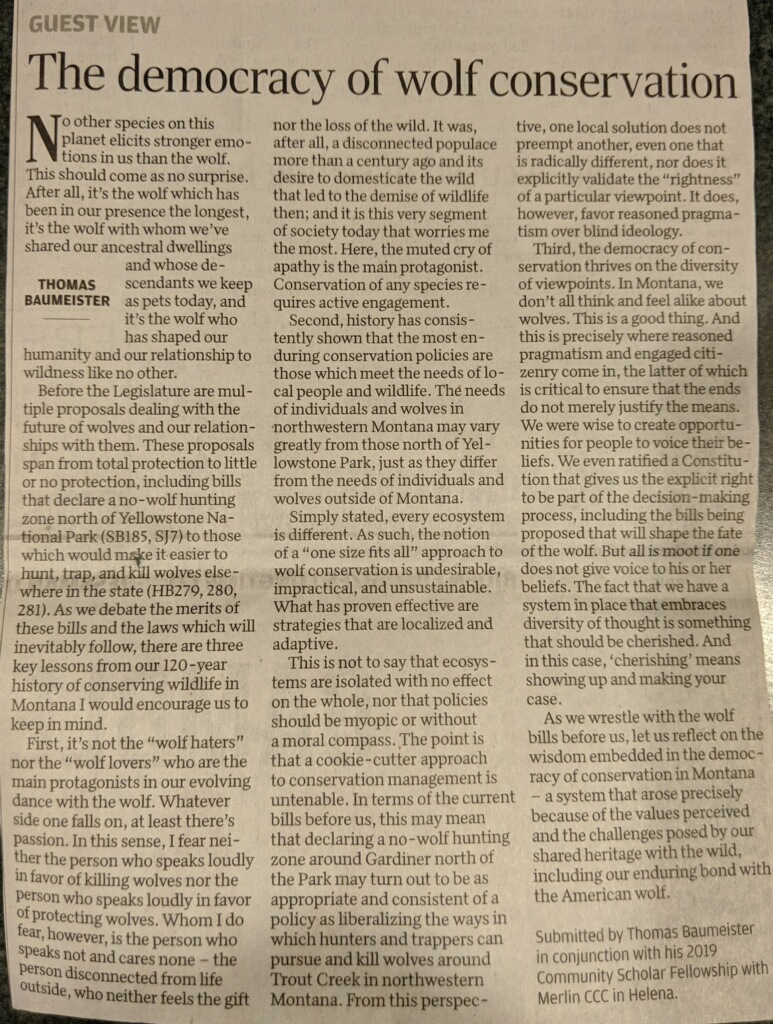
Thomas Baumeister
No other species on this planet elicits stronger emotions in us than the wolf. This should come as no surprise. After all, it’s the wolf which has been in our presence the longest, it’s the wolf with whom we’ve shared our ancestral dwellings and whose descendants we keep as pets today, and it’s the wolf who has shaped our humanity and our relationship to wildness like no other.
Before the Legislature are multiple proposals dealing with the future of wolves and our relationships with them. These proposals span from total protection to little or no protection, including bills that declare a no-wolf hunting zone north of Yellowstone National Park (SB 185, SJ 7) to those which would make it easier to hunt, trap, and kill wolves elsewhere in the state (HB 279, 280, 281). As we debate the merits of these bills and the laws which will inevitably follow, there are three key lessons from our 120-year history of conserving wildlife in Montana I would encourage us to keep in mind.
First, it’s not the “wolf haters” nor the “wolf lovers” who are the main protagonists in our evolving dance with the wolf. Whatever side one falls on, at least there’s passion. In this sense, I fear neither the person who speaks loudly in favor of killing wolves nor the person who speaks loudly in favor of protecting wolves. Whom I do fear, however, is the person who speaks not and cares none – the person disconnected from life outside, who neither feels the gift nor the loss of the wild. It was, after all, a disconnected populace more than a century ago and its desire to domesticate the wild that led to the demise of wildlife then; and it is this very segment of society today that worries me the most. Here, the muted cry of apathy is the main protagonist. Conservation of any species requires active engagement.
Second, history has consistently shown that the most enduring conservation policies are those which meet the needs of local people and wildlife. The needs of individuals and wolves in northwestern Montana may vary greatly from those north of Yellowstone Park, just as they differ from the needs of individuals and wolves outside of Montana. Simply stated, every ecosystem is different. As such, the notion of a “one size fits all” approach to wolf conservation is undesirable, impractical, and unsustainable. What has proven effective are strategies that are localized and adaptive. This is not to say that ecosystems are isolated with no effect on the whole, nor that policies should be myopic or without a moral compass. The point is that a cookie-cutter approach to conservation management is untenable. In terms of the current bills before us, this may mean that declaring a no-wolf hunting zone around Gardiner north of the Park might turn out to be as appropriate and consistent of a policy as liberalizing the ways in which hunters and trappers can pursue and kill wolves around Trout Creek in northwestern Montana. From this perspective, one local solution does not preempt another, even one that is radically different, nor does it explicitly validate the “rightness” of a particular viewpoint. It does, however, favor reasoned pragmatism over blind ideology.
Third, the democracy of conservation thrives on the diversity of viewpoints. In Montana, we don’t all think and feel alike about wolves. This is a good thing. And this is precisely where reasoned pragmatism and engaged citizenry come in, the latter of which is critical to ensure that the ends do not merely justify the means. We were wise to create opportunities for people to voice their beliefs. We even ratified a Constitution that gives us the explicit right to be part of the decision-making process, including the bills being proposed that will shape the fate of the wolf. But all is moot if one does not give voice to his or her beliefs. The fact that we have a system in place that embraces diversity of thought is something that should be cherished. And in this case, ‘cherishing’ means showing up and making your case.
As we wrestle with the bills before us, let us reflect on the wisdom embedded in the democracy of conservation in Montana – a system that arose precisely because of the values perceived and the challenges posed by our shared heritage with the wild, including our enduring bond with the American wolf.
By Thomas Baumeister in conjunction with his 2019 Community Scholar Fellowship with Merlin CCC.

Prompted by bills currently being proposed in Montana that will decide the fate of wolves for years to come and the democratic process of conservation, Thomas asks us to consider the role of adaptive management and pragmatism (over blind ideology) and engaged citizenry (so that the ends do not justify the means) in wolf conservation. The above article went live on the Merlin website on Friday, February 8th, was submitted for consideration as an op-ed to the Helena Independent Record on the same day, and appeared as a featured “guest view” article on-line and in print on Wednesday, February 13th.
